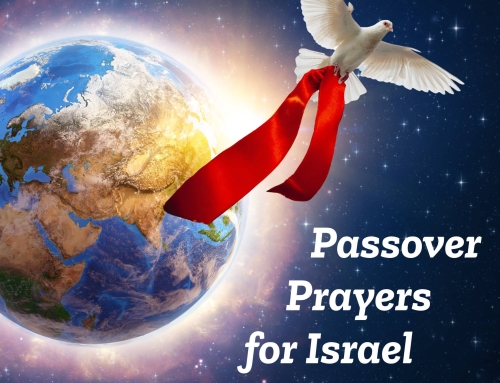From the weekly prayer update by Martin & Norma Sarvis in Jerusalem:
This weekend the cycle through the Torah began anew. This first reading is called B’resheet—“In the Beginning.”
TORAH: Genesis 1:1—6:8
HAFTARAH : Isaiah 42:5—43:10
TORAH
*Genesis 1:1-5. “In the beginning Elohim (English: God) created the heavens and the earth. The earth was without form, and void; and darkness was on the face of the deep. And the Spirit of God was hovering over the face of the waters. Then Elohim said, “Let there be light; and there was light. And Elohim saw the light, that it was good; and Elohim divided the light from the darkness. Elohim called the light Day, and the darkness He called Night. And there was evening and there was morning, one day.”
As we open to the first chapter of this God–breathed (II Timothy 3:16) book, GOD is simply there–creating. The SPIRIT of God is there (vs 2). And as God speaks, His living WORD is there (Vs 3; John 1:1). Elohim is a Hebrew word translated into English God. It is a plural word—yet when used of the Hebrew God it is always treated with a singular verb.
*Genesis 1:3. “God said: ‘Let there be light!’ And there was light.” The Scriptures do not say that God “created” light (God Himself is light, I John 1:5). Rather, He spoke it forth—“Be light!”—and it was released into His creation! John 1:1-9 speaks of Yeshua as being God’s Word, in whom was life “which is the light for men.”
There are a number of words used for God’s actions during these early “beginnings” chapters: creating (from nothing that is seen, Hebrews 11:3); making; building; fashioning or shaping (out of something already created); working (interestingly, for bringing into being the “adam” (man) in His image, both the acts of creating and fashioning are used (Genesis 1:2, 2:7).
*Genesis 1:5. “And there was evening and there was morning, one day.” Today, in Israel all days for religious observance (such as the Sabbath or feast days) are reckoned from sundown the evening before rather than sunrise.
*Genesis 2:3. “And on the seventh day Elohim ended His creative work which He had done, and He ceased on the seventh day from all His creative work which He had done. Then Elohim blessed the seventh day and sanctified it (Hebrew: “made it holy”), because in it He ceased from all His creative work which Elohim had created and made”. It is significant that the first place in Scripture in which we see God making something “holy” or “set apart” is here in relation to the seventh day of the week when He shabbat—“ceased working.”
*Genesis 1:27. “So God created man in His image, in the image of Elohim He created him; masculine and feminine He created them.” “Man” in Hebrew is adam. In Genesis 2:7, we are shown that Elohim formed the adam our of adamah (earth—which, in turn, is adomah—“reddish in colour”). The modern-day Hebrew term for “human being” is still benei-adam—“son (or child) of adam.” From this passage it is clear that God, although always referred to in the masculine gender, bears, nevertheless, within His nature both the masculine and feminine which is transferred into the nature of those created “in His image.”
By the end of Chapter 3 that image is marred and what had received the breath of life is, because of sin, already dying. In Genesis 4:1 the man and woman have begun to reproduce, and realize that their Creator and the One through whom this new life comes has a name, YHVH (Yehovah, “The LORD”). Their sons bring offerings to this YHVH (4:3); yet it will be many generations before Humankind comes to know and use that Name in a personal and intimate sense (Exodus 3:15b; 6:2-3).
In Genesis 4:8 murder is committed, and Abel, a good man whose sacrifice pleased God, becomes the first man to die. It is interesting that Abel’s name in the Hebrew is spelled the same as the Hebrew word for “vapour” or “vanity.” (This word both begins and permeates the book of Ecclesiastes which we have been reading during the feast of Sukkot). Life is but a vapour which is here and passes away, and the life of Abel the good and that of Cain the wicked are both temporary.
*Genesis 4:26. “And as for Seth, to him also a son was born; and he named him Ehnoshe.” It was perhaps with an awareness of the death of his brother Abel, as well as of the sin-sickness obviously at work in his eldest brother Cain that Seth chose to name his first son Ehnoshe. Ehnoshe is often translated into English “man” (Psalm 8:4, “What is man (ehnoshe) that You are mindful of him, and the son of man (ben-adam) that you visit him?”) But the word more literally means “mortal.” Just as English “mortal” has to do with that in man which dies (“mortuary” is related to that word), so ehnoshe has within it a reference to the fallen effect of sin in the children of Adam. Ehnushe, a word using the same Hebrew letters, appears in Jeremiah 17:9, where it says that the heart is deceitful above all things and “desperately wicked” (NJKV), “desperately sick” (ESV and NAS), “beyond cure” (NIV).
By Genesis 6 the earth is corrupted through sinful man in conjunction with rebellious angelic beings. “Then YHVH saw that the wickedness of man was great in the earth, and that every intent of the thoughts of his heart was only evil continually…So YHVH said, ‘I will destroy the man (Hebrew: the adam) whom I have created from the face of the earth (Hebrew: the adamah).’ But Noah found grace in the eyes of the LORD” (6:5,7a, 8). To “find grace in the eyes of” is an expression which is still common in modern Hebrew, meaning “to bring pleasure to.”
PLEASE PRAY: that today when, “as it was in the days of Noah” (Matthew 24:37), we are faced with a rapidly rising darkness of evil on the earth, there will arise also not one but a multitude of latter-day “Noah’s”—who will bring pleasure to their LORD, who will “walk with God,” who will “find grace in His eyes.” The English translation of a popular Hebrew worship song, written some years back by an Israeli teenager reads:
Come Spirit, Come Spirit, Come today/The Desire of my heart is to find grace in your eyes/The desire of my soul is to be more like you/Come God, Dwell within me, Make me pure/Focus my eyes on what pleases You that I may be devoted to You
–Boi Ruakh. ©2004 by Keren Seguin
HAFTARAH
*Isaiah 42:5-7. “Thus says God the LORD, Who created the heavens and stretched them out, Who spread forth the earth and that which comes from it, Who gives breath to the people on it, and spirit to those who walk on it: ‘I, YHVH, have called you in righteousness, and will hold your hand; I will keep you and give you as a covenant to the people, as a light to the Gentiles, to open blind eyes, to bring out prisoners from the prison, those who sit in darkness from the prison house.’”
*Isaiah 43:1-3b. “But now, thus says the LORD, who created you, O Jacob, and He who formed you, O Israel: ‘Fear not, for I have redeemed you; I have called you by your name; You are Mine. When you pass through the waters, I will be with you; and through the rivers, they shall not overflow you. When you walk through the fire, you shall not be burned, nor shall the flame scorch you. For I am the LORD your God, the Holy One of Israel, your Saviour.”
*Isaiah 43:5-7. “Fear not, for I am with you; I will bring your descendants from the east, and gather you from the west; I will say to the north, ‘Give them up!’ and to the south, ‘Do not keep them back!’ Bring my sons from afar, and my daughters from the ends of the earth—everyone who is called by My name, whom I have created for My glory; I have formed him, yes, I have made him.’”
*Isaiah 43:10. “‘You are my witnesses,’ says the LORD, ‘and my servant whom I have chosen, that you may know and believe Me, and understand that I am He. Before Me there was no God formed, nor shall there be after Me.’”
Martin and Norma Sarvis
Jerusalem
[The readings for next week (19-25 October) are called Noach—“Noah”. TORAH: Genesis 6:9—11:32; HAFTARAH: Isaiah 54:1—55:5; Rosh Chodesh Cheshvan (the Eighth Month): Numbers 28:9-15, Isaiah 66:1-24]







Leave A Comment